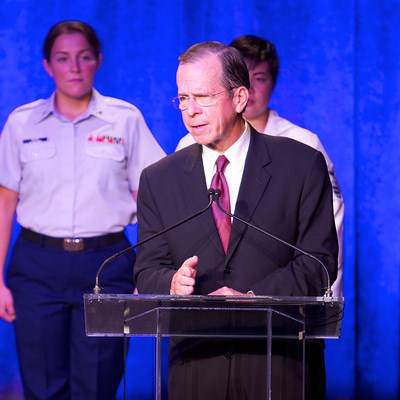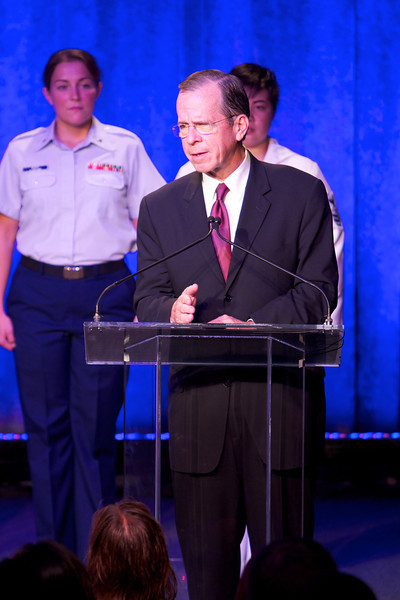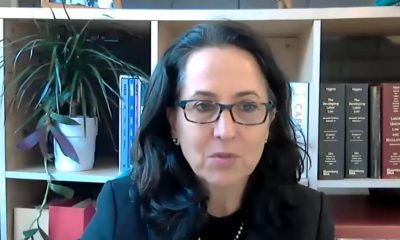National
Mullen honored at NYC “Don’t Ask, Don’t Tell” repeal celebration
The repeal of “Don’t Ask, Don’t Tell” became official on Sept. 20, 2011


Former Chair of the Joint Chiefs of Staff Adm. Mike Mullen at the Intrepid Sea, Air and Space Museum (Photo by TJ Sengel)
NEW YORK — More than 1,000 people gathered at the Intrepid Sea, Air and Space Museum in Manhattan on Tuesday to commemorate the first anniversary of the repeal of the military’s ban on openly gay and lesbian servicemembers.
Servicemembers Legal Defense Network, OutServe and the Interbank Roundtable Committee honored former chair of the Joint Chiefs of Staff Adm. Mike Mullen for the role he played in the repeal of ‘Don’t Ask, Don’t Tell.’ Advocates note that his testimony before the Senate Armed Service Committee in Feb. 2010 in support of openly gay and lesbian servicemembers was a pivotal moment in the fight against the Clinton-era law.
President Obama signed the repeal bill into law later that year after it passed with bi-partisan support.
“One of the things I pass on and I know you know this is it’s actually pretty easy to stand up for what you believe in,” said Mullen, who attended the event with his wife Deborah. “It’s pretty easy to stand up and represent the values you have held close for your entire life and be fortunate enough to be in a leadership position where that value actually crosses over in a time and a place and in a way where you as a leader can really make a difference. So I feel blessed to [have been] there and blessed to [have represented] all of us in the United States military at a time that made such a difference in so many lives.”
Mullen, who retired from the U.S. Navy last September, further noted that 70,000 servicemembers remain in Afghanistan nearly 11 years after the war began after the Sept. 11 terrorist attacks.
“Keep them in our thoughts and our prayers,” he said. “They’re courageous young people who have made such a difference as you have, so this celebration tonight is one of great gratitude.”
ABC newswoman Barbara Walters, who emceed the event, described Mullen as her “hero” before she applauded gay servicemembers and those who fought to repeal “Don’t Ask, Don’t Tell.”
“You have fought for something that is right — the end of the ‘Don’t Ask, Don’t Tell’ policy, so tonight is about history. Tonight is also honoring each and every one of you who has served our nation,” she said. “Tonight for the first time in American history, you have the chance to stand before this leader, an admiral, the chairman of the Joint Chiefs of Staff and the man who helped you on this journey and we all simply say, thank you sir.”
“In how’s effected the military, it’s only been positive,” retired U.S. Army Brigadier Gen. John Adams told the Blade before Mullen spoke. “The military works, the services work, there’s been zero effect on combat cohesion as some people said there would be. In fact if nothing else what it’s meant is tens of thousands of gays and lesbians who were already serving now can serve without being afraid of somebody looking over their shoulder and finding out who they’re spending their off-duty time with and asking them to deny who they are. That’s ridiculous. That’s history. Thank goodness.”
Josh Seefried, co-director of OutServe, agreed.
“People can go to work and feel like they don’t have to look over their shoulder anymore,” he said when asked how things have changed since the Pentagon allowed gays and lesbians to serve openly. “It’s a lot easier to go to work and not have to worry bout losing their career they love and being fired.”
Will “Don’t Ask, Don’t Tell” once again become law?
Ohio Congressman Jim Jordan, who chairs the Republican Study Committee, said last week that he supports the reinstatement of “Don’t Ask, Don’t Tell.” GOP presidential candidate Mitt Romney has previously indicated that he would not seek to reinstate the policy as president.
‘There’s just no turning back the clock,” said R. Clarke Cooper, executive director of Log Cabin Republicans, told the Blade. An Army Reserve officer, Cooper attended the Intrepid event in uniform. “Open service has not been an issue, in fact if anything it’s been beneficial for recruitment and retention. People can be honest and open about who they are. They don’t have to hide from themselves or their command. And it’s been a good thing.”
Former Pennsylvania Congressman Patrick Murphy, who helped spearhead “Don’t Ask, Don’t Tell” repeal efforts on Capitol Hill, took a more partisan approach.
“It’s absolutely going to happen if they win the White House and get control of the Senate because they [the Republicans] already have control of the House,” he told the Blade. “It’s in their platform. It’s going to happen if we let it happen, but hopefully we all continue the march to full equality in America. It was a proud moment to pass ‘Don’t Ask, Don’t Tell’ repeal and then to see seven states pass marriage equality, but there’s still over 40 states that we have to make sure every American has full equality in our country in 2012.”
Seefried echoed Murphy, Cooper and others who described the end of “Don’t Ask, Don’t Tell” is one step towards full equality for LGBT servicemembers and Americans.
“There’s still a lot more work to do,” he said. “A lot more people don’t have harder support right now. We have the Defense of Marriage Act and there’s a lot of things that the Pentagon can do right now that they just haven’t done. And we also have transgender service to achieve, so I think we have a lot of work to do and we have to realize that.”
Lesbian New York City Council Speaker Christine Quinn, gay MSNBC anchor Thomas Roberts, former Human Rights Campaign President Elizabeth Birch, Fox Morning Extra co-host Tom Murro and Brent Ridge and Josh Kilmer-Purcell of “The Fabulous Beekman Boys” were among those who attended the event.
Tammy Majors of Arizona said she was discharged from the U.S. Air Force under “Don’t Ask, Don’t Tell” when a woman she had dated told her commanding officer about their relationship. She became emotional as she waited to greet Mullen after he spoke.
“I think this is a great honor and I never thought I would see this happen, ever. I’m just really happy. I’m excited,” she told the Blade about the ability of gays and lesbians to serve openly. “I just wanted to celebrate with everyone else.”
The event also doubled as a fundraiser that raised more than $700,000. Mullen said this money will benefit wounded veterans and other related causes.
Pennsylvania
Malcolm Kenyatta could become the first LGBTQ statewide elected official in Pa.
State lawmaker a prominent Biden-Harris 2024 reelection campaign surrogate

Following his win in the Democratic primary contest on Wednesday, Pennsylvania state Rep. Malcolm Kenyatta, who is running for auditor general, is positioned to potentially become the first openly LGBTQ elected official serving the commonwealth.
In a statement celebrating his victory, LGBTQ+ Victory Fund President Annise Parker said, “Pennsylvanians trust Malcolm Kenyatta to be their watchdog as auditor general because that’s exactly what he’s been as a legislator.”
“LGBTQ+ Victory Fund is all in for Malcolm, because we know he has the experience to win this race and carry on his fight for students, seniors and workers as Pennsylvania’s auditor general,” she said.
Parker added, “LGBTQ+ Americans are severely underrepresented in public office and the numbers are even worse for Black LGBTQ+ representation. I look forward to doing everything I can to mobilize LGBTQ+ Pennsylvanians and our allies to get out and vote for Malcolm this November so we can make history.”
In April 2023, Kenyatta was appointed by the White House to serve as director of the Presidential Advisory Commission on Advancing Educational Equity, Excellence and Economic Opportunity for Black Americans.
He has been an active surrogate in the Biden-Harris 2024 reelection campaign.
The White House
White House debuts action plan targeting pollutants in drinking water
Same-sex couples face higher risk from environmental hazards

Headlining an Earth Day event in Northern Virginia’s Prince William Forest on Monday, President Joe Biden announced the disbursement of $7 billion in new grants for solar projects and warned of his Republican opponent’s plans to roll back the progress his administration has made toward addressing the harms of climate change.
The administration has led more than 500 programs geared toward communities most impacted by health and safety hazards like pollution and extreme weather events.
In a statement to the Washington Blade on Wednesday, Brenda Mallory, chair of the White House Council on Environmental Quality, said, “President Biden is leading the most ambitious climate, conservation, and environmental justice agenda in history — and that means working toward a future where all people can breathe clean air, drink clean water, and live in a healthy community.”
“This Earth Week, the Biden-Harris Administration announced $7 billion in solar energy projects for over 900,000 households in disadvantaged communities while creating hundreds of thousands of clean energy jobs, which are being made more accessible by the American Climate Corps,” she said. “President Biden is delivering on his promise to help protect all communities from the impacts of climate change — including the LGBTQI+ community — and that we leave no community behind as we build an equitable and inclusive clean energy economy for all.”
Recent milestones in the administration’s climate policies include the U.S. Environmental Protection Agency’s issuance on April 10 of legally enforceable standard for detecting and treating drinking water contaminated with polyfluoroalkyl substances.
“This rule sets health safeguards and will require public water systems to monitor and reduce the levels of PFAS in our nation’s drinking water, and notify the public of any exceedances of those levels,” according to a White House fact sheet. “The rule sets drinking water limits for five individual PFAS, including the most frequently found PFOA and PFOS.”
The move is expected to protect 100 million Americans from exposure to the “forever chemicals,” which have been linked to severe health problems including cancers, liver and heart damage, and developmental impacts in children.
An interactive dashboard from the United States Geological Survey shows the concentrations of polyfluoroalkyl substances in tapwater are highest in urban areas with dense populations, including cities like New York and Los Angeles.
During Biden’s tenure, the federal government has launched more than 500 programs that are geared toward investing in the communities most impacted by climate change, whether the harms may arise from chemical pollutants, extreme weather events, or other causes.
New research by the Williams Institute at the UCLA School of Law found that because LGBTQ Americans are likelier to live in coastal areas and densely populated cities, households with same-sex couples are likelier to experience the adverse effects of climate change.
The report notes that previous research, including a study that used “national Census data on same-sex households by census tract combined with data on hazardous air pollutants (HAPs) from the National Air Toxics Assessment” to model “the relationship between same-sex households and risk of cancer and respiratory illness” found “that higher prevalence of same-sex households is associated with higher risks for these diseases.”
“Climate change action plans at federal, state, and local levels, including disaster preparedness, response, and recovery plans, must be inclusive and address the specific needs and vulnerabilities facing LGBT people,” the Williams Institute wrote.
With respect to polyfluoroalkyl substances, the EPA’s adoption of new standards follows other federal actions undertaken during the Biden-Harris administration to protect firefighters and healthcare workers, test for and clean up pollution, and phase out or reduce use of the chemicals in fire suppressants, food packaging, and federal procurement.
Maine
Maine governor signs transgender, abortion sanctuary bill into law
Bomb threats made against lawmakers before measure’s passage

BY ERIN REED | On Tuesday, Maine Gov. Janet Mills signed LD 227, a sanctuary bill that protects transgender and abortion providers and patients from out-of-state prosecution, into law.
With this action, Maine becomes the 16th state to explicitly protect trans and abortion care in state law from prosecution. This follows several bomb threats targeting state legislators after social media attacks from far-right anti-trans influencers such as Riley Gaines and Chaya Raichik of Libs of TikTok.
An earlier version of the bill failed in committee after similar attacks in January. Undeterred, Democrats reconvened and added additional protections to the bill before it was passed into law.
The law is extensive. It asserts that gender-affirming care and reproductive health care are “legal rights” in Maine. It states that criminal and civil actions against providers and patients are not enforceable if the provision or access to that care occurred within Maine’s borders, asserting jurisdiction over those matters.
It bars cooperation with out-of-state subpoenas and arrest warrants for gender-affirming care and abortion that happen within the state. It even protects doctors who provide gender-affirming care and abortion from certain adverse actions by medical boards, malpractice insurance, and other regulating entities, shielding those providers from attempts to economically harm them through out-of-state legislation designed to dissuade them from providing care.
You can see the findings section of the bill here:
The bill also explicitly enshrines the World Professional Association of Transgender Health’s Standards of Care, which have been the target of right-wing disinformation campaigns, into state law for the coverage of trans healthcare:
The bill is said to be necessary due to attempts to prosecute doctors and seek information from patients across state lines. In recent months, attorneys general in other states have attempted to obtain health care data on trans patients who traveled to obtain care. According to the U.S. Senate Finance Committee, attorneys general in Tennessee, Indiana, Missouri, and Texas attempted to obtain detailed medical records “to terrorize transgender teens in their states … opening the door to criminalizing women’s private reproductive health care choices.”
The most blatant of these attempts was from the attorney general of Texas, who, according to the Senate Finance Committee, “sent demands to at least two non-Texas entities.” One of these entities was Seattle Children’s Hospital, which received a letter threatening administrators with arrest unless they sent data on Texas patients traveling to Seattle to obtain gender-affirming care.
Seattle Children’s Hospital settled that case out of court this week, agreeing to withdraw its Texas business registration in return for Texas dropping its investigation. This likely will have no impact on Seattle Children’s Hospital, which has stated it did not treat any youth via telemedicine or in person in Texas; the hospital will be able to continue treating Texas youth who travel outside of Texas to obtain their care. That settlement was likely compelling due to a nearly identical law in Washington that barred out-of-state investigations on trans care obtained solely in the state of Washington.
The bill has faced a rocky road to passage. A similar bill was debated in January, but after coming under intense attack from anti-trans activists who misleadingly called it a “transgender trafficking bill,” the bill was voluntarily withdrawn by its sponsor.
When LD 227 was introduced, it faced even more attacks from Gaines and Libs of TikTok. These attacks were followed by bomb threats that forced the evacuation of the legislature, promising “death to pedophiles” and stating that a bomb would detonate within a few hours in the capitol building.
Despite these threats, legislators strengthened both the abortion and gender-affirming care provisions and pressed forward, passing the bill into law. Provisions found in the new bill include protecting people who “aid and assist” gender-affirming care and abortion, protections against court orders from other states for care obtained in Maine, and even protections against adverse actions by health insurance and malpractice insurance providers, which have been recent targets of out-of-state legislation aimed at financially discouraging doctors from providing gender-affirming care and abortion care even in states where it is legal.
See a few of the extensive health insurance and malpractice provisions here:
Speaking about the bill, Gia Drew, executive director of Equality Maine, said in a statement, “We are thrilled to see LD 227, the shield bill, be signed into law by Gov. Mills. Thanks to our pro equality and pro reproductive choice elected officials who refused to back down in the face of disinformation. This bill couldn’t come into effect at a better time, as more than 40 percent of states across the country have either banned or attempted to block access to reproductive care, which includes abortions, as well as transgender healthcare for minors. Thanks to our coalition partners who worked tirelessly to phone bank, lobby, and get this bill over the finish line to protect community health.”
Destie Hohman Sprague of the Maine Women’s Lobby celebrated the passage of the bill despite threats of violence, saying in a statement, “A gender-just Maine ensures that all Mainers have access to quality health care that supports their mental and physical wellbeing and bodily autonomy, including comprehensive reproductive and gender-affirming care. We celebrate the passage of LD 227, which helps us meet that goal. Still, the patterns of violence and disinformation ahead of the vote reflected the growing connections between misogyny, extremism, and anti-democratic threats and actions. We must continue to advocate for policies that protect bodily autonomy, and push back against extremist rhetoric that threatens our states’ rights and our citizens’ freedoms.”
The decision to pass the legislation comes as the Biden administration released updated HIPAA protections that protect “reproductive health care” from out-of-state prosecutions and investigations.
Although the definition of “reproductive health care” is broad in the new HIPAA regulations, it is uncertain whether they will include gender-affirming care. For at least 16 states, though, gender-affirming care is now explicitly protected by state law and shielded from out-of-state legislation, providing trans people and those seeking abortions with protections as the fight increasingly crosses state lines.
****************************************************************************

Erin Reed is a transgender woman (she/her pronouns) and researcher who tracks anti-LGBTQ+ legislation around the world and helps people become better advocates for their queer family, friends, colleagues, and community. Reed also is a social media consultant and public speaker.
******************************************************************************************
The preceding article was first published at Erin In The Morning and is republished with permission.
-

 State Department2 days ago
State Department2 days agoState Department releases annual human rights report
-

 Maryland4 days ago
Maryland4 days agoJoe Vogel campaign holds ‘Big Gay Canvass Kickoff’
-

 Politics3 days ago
Politics3 days agoSmithsonian staff concerned about future of LGBTQ programming amid GOP scrutiny
-

 The White House1 day ago
The White House1 day agoWhite House debuts action plan targeting pollutants in drinking water















